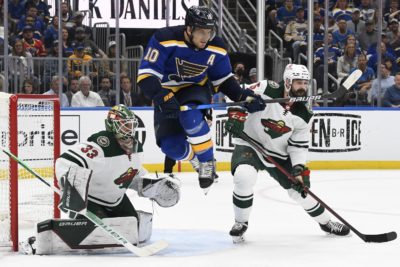After losing two of the first three games in the best-of-seven series, the Blues were in trouble. After losing the series opener the Minnesota Wild charged back for two straight wins, outscoring The Note 11-3. The second victory was a 5-1 thrashing at Enterprise Center, a rout that left the home team thunderstruck and embarrassed.
Blues fans were worried. The town’s clucking media went into the Chicken Little routine. The snarky analysts at The Athletic were probably kissing their forecast model that gave the Wild a 75 percent chance of winning the series … and that was before the teams even played a game.
Inside the Blues locker room: calmness, confidence and the collective state of mind formed by previous comebacks and shaped by the character that survives ordeals. A head coach and 10 members of the current Blues team knew what it was like to be down, knew what it was like to stay strong, knew what it was like to reinforce psychological vulnerabilities to win the Stanley Cup.

May 12, 2022; St. Louis, Missouri, USA; St. Louis Blues center Brayden Schenn (10) attempts to screen Minnesota Wild goaltender Cam Talbot (33) during the second period in game six of the first round of the 2022 Stanley Cup Playoffs at Enterprise Center. Mandatory Credit: Jeff Le-USA TODAY Sports
After the Friday-night fright and the four-goal loss in Game 3 that seemingly put the Wild in control, the Blues did not panic. They did not tremble with anxiety. They took action and showed the value of a championship-caliber temperament.
“We’ll refocus and adjust and we’ll come out ready to go,” center Tyler Bozak said after the Game 3 disaster.
Done.
The Blues recovered and rebooted.
And Berube’s boys booted the Wild out of the tournament.
The Blues responded to the challenge and the doubts and winched their way to three consecutive wins, all by wide margins. The Blues shut down Minnesota’s supply lines, leaving Wild superstar Kirill Kaprizov stranded and looking for help that never arrived. The Blues owned 15 of the 20 goals scored over the final three games. After breaking the Wild in every way, the Blues put the series to rest with the official certification: a 5-1 triumph on Thursday night at Enterprise Center.
Here are a dozen reasons why the Blues advanced to the second round for an intriguing matchup against the abundantly talented Colorado Avalanche …
1. The heart of 2019 beats on. In the 26-game crusade to the first Stanley Cup in franchise history, the Blues received 44 goals and 105 assists from nine skaters that are still here: forwards Ryan O’Reilly, David Perron, Vladimir Tarasenko, Brayden Schenn, Ivan Barbashev, Robert Thomas and Bozak – plus defensemen Colton Parayko and Robert Bortuzzo.
That nine-man contingent collectively provided an average of 1.69 goals and 5.7 points per game during the 2019 Stanley Cup playoffs. They weren’t just along for the ride; they played major roles in leading the drive.
And in the conquest of the Wild? That same band of brothers combined for 17 goals and 19 assists in this first-round march to the next challenge. Here they are, three years older, trying to do it all over again.
And of course, there’s goaltender Jordan Binnington. He won 16 games in the 2019 postseason and delivered the Cup with a surreal performance in Game 7 at Boston. Binnington overcame adversity this season and got himself ready to answer the call should the Blues make the switch in goal.
When coach Craig Berube replaced Ville Husso with Binnington going into Game 4, Binnington came through in a way that brought back fond memories from 2019. In three consecutive wins that capped the series, Binnington had a .943 save percentage overall – and a sensational .957 save rate at five on five. He rightfully holds the franchise record with 19 career postseason wins by a goaltender.
The nine skaters, the goaltender and the coach had a substantial impact on this series. Not just through performance – but also through leadership, and the ability to remain poised and focused through the hard times. The Wild won two games from the Nineteen squad but couldn’t make the Blues crack when they had the chance. When you win a championship, the experience can go with you – and keep you strong when others get weak.
Not always, of course. Last postseason the Blues were out of gas long before they got swept by the Avs in the first round. A year later they’re much healthier and fresher and the 2019 mojo could work again. This group is really special.
2. The brutal coaching mismatch. Berube was magnificent in so many ways. The Binnington decision. Going with, and staying with, the alignment of seven defensemen and 11 forwards as insurance for more potential injuries to the blueliners. Handling the shortage of experienced defensemen (Game 4 in particular) and getting much better results than expected. Reading situations and churning his lines in the mixer. As for Minnesota, give me a few seconds here. I’m trying to remember … Did the Wild have a coach?
3. Mental strength. I was wrong about this one. I didn’t think the Blues had some psychological grip on the Wild because of a rivalry that’s been so one-sided in recent times. I thought the Wild would go into the first-round meeting and shake off all of the bad things the Blues had done to them. Well, so much for respecting the Wild. After winning the series in six games, the Blues are 13-3-1 against the Wild since the start of last season. Postseason included. Once the Blues got out of a jam (the awful Game 3 loss) and pushed back, the Wild went haywire and fell apart.
4. Cockeyed special teams: This played out as expected. Before the series the only variable was officiating; would the refs call enough penalties to make the special teams relevant? Yes. The Blues doubled up the Wild in power play goals, 8-4. And that includes a 4-2 edge on PP goals in the final three games. The Blues scored a power play goal (or more in all six games, converted PP opportunities at a rate of 30.7 percent, and killed off 83.4% of Minnesota’s power plays. And how about Scott Perunovich? After missing several months after shoulder surgery, he unexpectedly returned to action to serve as a point guard on the power play – and assisted on three goals. The Blues’ depth at defense made a positive difference.
5. The Blues were effective in slowing Kaprizov. What? He scored seven goals! That isn’t stopping him. Obviously I disagree. Kaprizov did plenty of damage – including three power play goals – but the timing was an essential factor. And Kaprizov didn’t burn the Blues at even strength when it really mattered. In the final three games, all wins by St. Louis, Kaprizov played 48 minutes 36 seconds at even strength and had only one goal – and eight shots on net.
With Kaprizov largely quieted at five on five over the final three games, the Wild couldn’t offer him any backup support. Two teammates each chipped in a single goal at five on five but that was it … and next to nothing.
The Blues limited the Wild to an average of 2.66 goals per game. That’s notable because Minnesota ranked fifth in the NHL with an average of 3.66 regular-season goals per game.
6. The Blues: spreading the scoring around. And impact scorers did their thing. We’re used to that, right? With the Wild scratching for offense as the series progressed, the Blues got goals from eight players in the six games. But we’re not talking about a random goal here and there. David Perron scored five times. Ryan O’Reilly scored five times. Vladimir Tarasenko scored five times. Jordan Kyrou scored three times. Pavel Buchnevich didn’t score, but he set up four goals by teammates. Brayden Schenn didn’t score, but he dished three assists and pounded the Wild with nine hits, and consistently won puck battles to put the Blues on the attack.
After averaging 3.77 goals per regular-season game – third in the NHL – the Blues were close to that in averaging 3.66 goals in their six games against the Wild. And The Note averaged 5.0 goals in winning the final three games of the series.
7. The Blues shut down Minnesota’s No. 2 line. During the regular season, the Wild outscored opponents 25-5 when the line of Jordan Greenway, Joel Erikkson Ek and Marcus Foligno was on the ice. But the threesome vanished in this series when their team needed a rescue operation. In the final three games that terminated the Wild’s season the so-called “GREEF” line did not score in 23 minutes 31 seconds at five on five at five and managed only four shots on net. The Blues renamed it the “GRIEF” line.
8. After a slow start, the Blues seized the advantage at five on five. And that helped turn the series in their favor. In the first three games the Wild scored 70 percent of the five on five goals (7-3.) In the final three games, the Blues scored 75 percent of the five on five goals (8–3.) And in their three straight wins the Blues had a huge 6–1 advantage on high-danger goals at five on five.
9. General manager Doug Armstrong. The Blues wouldn’t be headed to the next round without the vital work done by their hockey operation. Armstrong skillfully restored peace when Vladimir Tarasenko created controversy by demanding a trade last summer. Including the playoff series No. 91 now has 39 goals and 49 assists in 81 games this season. Armstrong made the brilliant trade for young forward Pavel Buchnevich and signed veteran free-agent winger Brandon Saad. (Buchnevich and Saad combined for 54 goals and 46 assists during the regular season.)
Armstrong acquired defenseman Nick Leddy at the trade deadline; Thursday night Leddy gave the Blues a 1-0 lead on a goal that deflated the Wild’s energy. The signing of defenseman Scott Perunovich is paying off. Army and staff accumulated quality depth that successfully covered problem spots created by injuries – both regular season and postseason.
10. The marathon (defense) men. Pretty remarkable, but the Blues used 10 defensemen in the effort to push Minnesota from the playoffs: Justin Faulk, Colton Parayko, Nick Leddy, Niko Mikkola, Torry Krug, Robert Bortuzzo, Calle Rosen, Marco Scandella, Scott Perunovich and Steve Santini. As you know, the Blues lost Krug, Leddy, Scandella and Bortuzzo to injury during the series – though Bortuzzo returned to play in the final three games.
Kudos to Parayko and Faulk, who covered the injury-related gaps by increasing their load of minutes during the series. Both averaged around 26 minutes per game overall, but ramped up for 31 minutes each in Game 4 when the Blues were missing multiple defensemen. Moreover, Parayko (21:36) and Faulk (18:22) clocked the most time on the Blues’ penalty kill during the series.
Center Robert Thomas isn’t a defenseman, but he warrants praise here for frequently double shifting when the Blues went with only 11 forwards (one fewer than usual) when Berube went with seven defensemen in a game. In the six games Thomas played just under 30 combined minutes on the power play and penalty kill.
11. Roadwork: The Blues won two out of three at the Xcel Energy Center. That’s no small achievement considering that the Wild ranked fourth in the NHL in home-ice points percentage (.780) during the regular season after going 31-8-2 in St. Paul. Shades of 2019? The Blues posted 10 road wins en route to the Cup.
12. Faceoff machines: Ryan O’Reilly and Tyler Bozak combined to win 68.75 percent of the 92 faceoffs they took during the six-game series.
Congratulations to the Blues.
Thanks for reading …
-Bernie
Bernie invites you to listen to his opinionated and analytical sports-talk show on 590-AM The Fan, KFNS. It airs Monday through Thursday from 3-6 p.m. and Friday from 4-6 p.m. You can listen by streaming online or by downloading the “Bernie Show” podcast at 590thefan.com — the 590 app works great and is available in your preferred app store.
Follow Bernie on Twitter @miklasz
Please email your “Ask Bernie” questions to BernScoops@gmail.com



